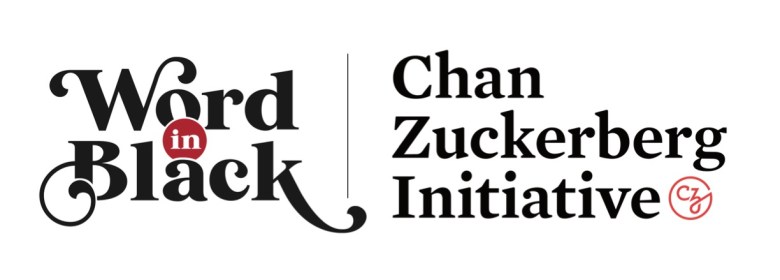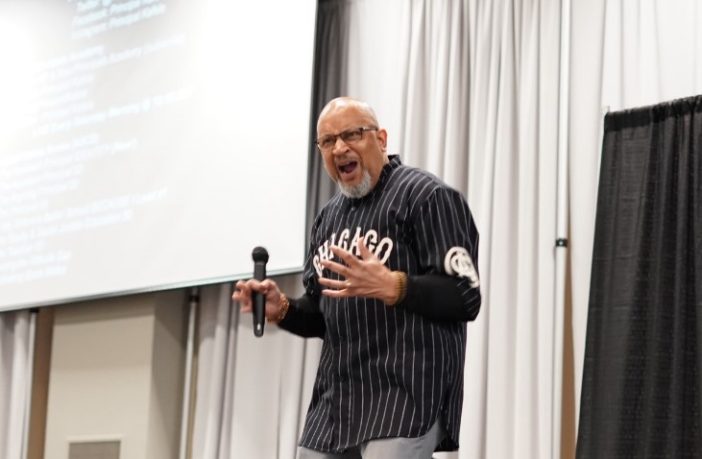By Reginald Williams,
Special to the AFRO
Principal Baruti Kafele recently stood before the sold-out crowd in Lima, Ohio, speaking with students, educators, parents, business owners and community advocates on the importance of sowing seeds of promise– not doubt– into today’s youth.
Principal Baruti Kafele ignites a crowd of students on stage, speaking on the importance of seeing youth in a positive light, full of promise.
(Courtesy Photo)
The 35-year education veteran, credited with being a master teacher and transformational school leader, keynoted the “I’m At Promise –Not at Risk” signature event that focused on helping students go from the cradle to prosperous careers– not from the cradle to prison.
The weekend of Feb. 24 was filled with educational activities and presenters, like Chike Akua, Ph.D., who also spoke to attendees.
“Our objective was to be intentional about addressing barriers youth and families face in school–in the space that could lead them to feeling left out and left alone,” explained Emmanuel Curtis, the host and brain trust behind the events. “The information and efforts given by every one of our presenters, authors and edu-tainers, Chike Akua and Principal Baruti Kafele, were beyond anything that I could’ve imagined. Their workshops were career altering.”
Sponsored by Jenga Lima, of My Brothers Keeper (MBK), Kafele and Akua were also tasked with facilitating professional development workshops with educators and school counselors. The mission for the weekend, which concluded with the “Music is Medicine” concert, aspired to bring awareness, information and advocacy for a population– specifically Black and Brown people, who are systematically underserved.
Black children, especially adolescent males, are commonly branded at risk. But what– Kafele asked–are they at risk of? He addressed the conference’s theme, while also encouraging change.
“The theme of the conference is ‘I’m at promise —not at risk,” explained Kafele. “If there’s anybody in this room who uses at-risk language, I’m going to strongly encourage you this afternoon to stop using that language. It stigmatizes the young people to whom it is being applied. When you say ‘at risk,’ then there’s another question you must ask. At risk of what? The implication is ‘at risk of going to jail; At risk of committing a crime; At risk of underachieving; At risk of failing; At risk of an early death–what are we talking about?”
Rather speaking negativity over the lives of Black children, Kafele promotes language that breathes promise.
“I would rather not look at a young person—Black children–with a mindset that I see them ‘at risk’ of something if it isn’t ‘at risk of greatness.’ Instead, I’ll use ‘at promise,’ ‘at possibility,’ ‘at probable’– ‘at most likely,’” explained Kafele.
While the language stigmatizes, the actions of school leaders nationwide too often criminalize Black students, especially Black adolescent males, subsequently placing them “at risk,” if for nothing other than being separated from educational opportunities.
One academic study reports that Black boys represent more than 50 percent of the 17,000 preschool students, ages three to five, expelled or suspended. Research conducted by Yale Child Study Center provides insight into some dynamics that drive the preschool-to-prison pipeline.
The Yale study revealed the results of eye-tracking software worn by teachers that gauged their eye movement whenever responding to classroom disturbances. Teachers were prone to first turn their attention toward Black boys whenever classroom disruptions occurred. Research reveals the cradle-to-prison pipeline is impacted by teachers swayed by their implicit biases.
“One of the reasons that preschool-to-prison pipelines even exist is because our children have not been taught the truth about their history,” explained Akua, an award-winning educator, “Many of our children have been gangsterized, criminalized, and hypersexualized. Unaddressed trauma in a people over time can look like culture. ”
Akua provided data, presented images society frequently uses to paint Black boys as less than, and offered impact statements that evoked several Asé moments.
“Some people see academic underachievement in our community and say, ‘It’s just a part of the culture.’ No, it’s not! It’s unaddressed trauma in our people over time looking like culture,” Akua explained. However, the professor of Educational Leadership at Clark Atlanta University, maintains that culture is the key to educational engagement and achievement.
“When you show them the greatness of their culture, their achievement skyrockets. But in the absence of that, they will continue to struggle,” said Akua.
Kafele, recognized as an “urban educator” and “turnaround school leader,” has grown a reputation for transforming failing schools and cultivating students’ excellence rooted in impoverished conditions. Noted for transforming Newark Tech from one of the lowest-performing schools to one of the nation’s best, Kafele said:
“As long as we fail to properly educate Black children as to who that is in their mirror historically, culturally, socially, economically, but particularly culturally and historically—we will be coming to these kinds of gatherings forever, asking the same questions. How do you close the achievement gap for Black children? How do you inspire our children to excel in the classroom,” explained Kafele.
In his commanding voice, Kafele questioned if Lima was committed to properly educating Black youth.

“When I say properly educated: are they being exposed to a curriculum, an instruction that tells them who they are?” quipped the coveted Milken Educator Award winner. “When they are in mathematics—is there something culturally relevant about this instruction that they can take the math and apply it to their Black lives? Is there something about the science that they are exposed to, that they can apply it to their Black life? Is there something about language arts, reading and writing that they can apply to their Black life?”
“In other words,” asked Kafele, “Is this curriculum and this instruction relevant to who they are, or is it something distant from them that when the bell rings at three o’clock for them to go home, they don’t see how those lessons are applicable to their lives?”
Public school curriculums often attempt to “White-out” the genius of Black thought. Curriculum teaches that Pythagoras, an ancient Greek mathematician, is credited as the founder of the Pythagorean theorem, considered a cornerstone of math, but fails to teach that Pythagoras was educated in ancient Egypt by Egyptian scholars who were Black.
“Education and literacy has always been sacred to African people,” explained Akua. “Going back thousands and thousands of years, there’s never been a time when education was not sacred to African people. We were the ones that gave the world reading and writing—language and literature. We gave them architecture, engineering, agricultural and astronomy, mathematics, science and technology,” Akua asked.
“How do you take a group of people that gave the world all that and then convince them that they are nothing but a race of pimps and players—criminals, thugs, ‘n-word,’ and ‘b-word?’ I call that cultural identity theft,” said Akua. “ [It] happens every day in schools with curriculums that continue to miseducate our children– with school districts that literally spend millions of dollars every year on materials that continue to miseducate our children and miseducate all children.”



